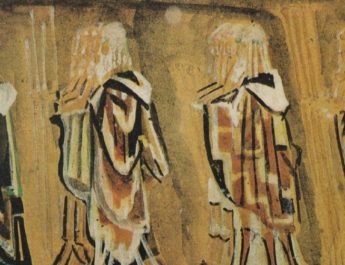Luke 8:26-39
Ordinary C30
26 Then they arrivedA at the regionB of the Gerasenes,C which is opposite Galilee.D
A “arrived” = katapleo. 1x in NT. From kata (down, against, throughout, among) + pleo (to sail, voyage); {probably from pluno (to plunge – so to wash); from pluo (to flow)}. This is to sail from the sea to the shore, to land at.
B “region” = chora. From chasma (gap, gulf, chasm, open space); from chasko (to gape, yawn). This is space, land, region, fields, open area – the countryside in contrast to the town.
C “Gerasenes” = Gerasenos. 3x in NT. Perhaps from Hebrew Girgashi (Girgashite; one of the tribes of Canaan) OR perhaps from Akkadian (clay or cod) OR related to Arabic (black mud) OR related to Hebrew garar (to drag out). This is Gerasene, a city whose name means “people who dwell in a place of clay soil or black mud.” See https://www.abarim-publications.com/Meaning/Girgashite.html#.X1Ztw8hKhPY
D “Galilee” = Galilaia. From Hebrew galil (cylinder, circuit, district); from galal (to roll in a literal or figurative sense, roll away, roll down, wallow, remove, trust). This is Galilee, meaning perhaps region or cylinder.
27 As he stepped outE on shore,F a manG from the cityH who hadI demonsJ metK him.
E “stepped out” = exerchomai. From ek (from, from out of) + erchomai (to come, go). This is to go out, depart, escape, proceed from, spread news abroad.
F “shore” = ge. This is earth, land, soil, region, country, the inhabitants of an area.
G “man” = aner. This is man, male, husband, or fellow. It can also refer to an individual.
H “city” = polis. This is a city or its inhabitants. It is a town of variable size, but one that has walls. This is where “metropolis” and “police” come from.
I “had” = echo. This is to have, hold, possess.
J “demons” = daimonion. From daimon (evil spirit, demon, fallen angel); perhaps from daio (giving out destinies). This is demon, evil spirit, god of another religion, or fallen angel.
K “met” = hupantao. 10x in NT. From hupo (by, under, about, subordinate to) + antao (to meet with personally) OR from hupo (see above) + anti (opposite, instead of, against). This is to encounter someone or to go to meet them.
For a longL timeM he had not wornN any clothes,O and he did not liveP in a houseQ but in the tombs.R
L “long” = hikanos. From hikneomai (to reach, come to, attain). This is sufficient, suitable, adequate, competent, ample.
M “time” = chronos. Time in the chronological sense, quantitative time or a duration of time.
N “worn” = enduo. From en (in, on, at, by, with, among) + duno (to sink into, set like the sun); {from duo (to go down, sink, or set)}. This is to put on as when one puts on clothes. It is the idea of sinking into one’s clothing.
O “clothes” = himation. From heima (garment) OR from ennumi (to put on). This is the outer garment, cloak, robe, or mantle. It is worn loosely over a tunic.
P “live” = meno. This is to stay, remain, wait, await, continue, abide, endure. It can mean to literally stay in a place or to remain in a condition or to continue with hope and expectation.
Q “house” = oikia. From oikos (house – the building, the household, the family, descendants; the temple). This is a house, household, goods, property, family, or means.
R “tombs” = mnema. Related to “live” in v27. 8x in NT. From mnaomai (to remember; by implication give reward or consequence); perhaps from meno (see note P above). This is memorial, tomb, or monument.
28 When he sawS Jesus,T he cried outU and fell downV before him, shouting,W
S “saw” = horao. To see, perceive, attend to, look upon, experience. Properly, to stare at and so implying clear discernment. This, by extension, would indicate attending to what was seen and learned. This is to see, often with a metaphorical sense. Can include inward spiritual seeing.
T “Jesus” = Iesous. From Hebrew Yehoshua (Joshua, the Lord is salvation); {from YHVH (proper name of the God of Israel; the self-existent and eternal one); {from havah (to become) or from hayah (to come to pass, become, be)} + yasha (to deliver, defend, help, preserve, rescue; properly, to be open, wide or free, which implies being safe. So, in a causative sense, this is to free someone)}. This is Jesus or Joshua in Greek – the Lord saves or the Lord is salvation.
U “cried out” = anakrazo. 5x in NT. From ana (up, again, back, anew) + krazo (to cry out, scream, shriek; onomatopoeia for the sound of a raven’s call; figuratively, this is means crying out urgently without intelligible words to express something that is deeply felt). This is to cry or shout out loudly. It can be excited or as a scream.
V “fell down” = prospipto. 8x in NT. From pros (at, to, toward, with) + pipto (to fall in a literal or figurative sense). This is to fall on or fall before. It can be a violent attack, bowing before, or beat against.
W “shouting” = phone + megas + eiron. Literally, “in a loud voice said.” Phone is probably from phemi (to declare, say, use contrasts in speaking to shed light on one point of view); {from phao (to shine) or phaino (to bring light, cause to appear, shine, become visible or clear). This is a voice, sound, tone or noise. It can also be a language or dialect. Megas is big in a literal or figurative sense – great, large, exceeding, abundant, high, mighty, perfect, strong, etc.
“What have you to do with me, Jesus, SonX of the Most HighY God?Z I begAA you, do not tormentBB me,”
X “Son” = Huios. This is son, descendant – a son whether natural born or adopted. It can be used figuratively for other forms of kinship.
Y “Most High” = Hupistos. 13x in NT. From hupsos (height, high position, heaven, dignity, eminence; elevation, altitude; to be exalted); from hupsi (on high, aloft); from huper (over, above, beyond) This is highest, heights, heaven. It can also refer to God as Most High or the Supreme One.
Z “God” = Theos. From Proto-Indo-European origins, meaning do, put, place. This is God or a god in general.
AA “beg” = deomai. From deo (to tie, bind, fasten, impel, compel; to declare something against the law or prohibited) This is having an urgent need because one is missing or needing something so it is an earnest appeal or pressing request.
BB “torment” = basanizo. 12x in NT. From basanos (touchstone used to test metals; figuratively used for interrogating using torture, torment, pain sickness); perhaps from the same as basis (step, hence foot; a pace); from baino (to walk, to go). This is to torture, interrogate by torture, torment, batter with waves, examine, strain.
29 for Jesus had commandedCC the uncleanDD spiritEE to come outFF of the man.GG
CC “commanded” = paraggello. From para (from beside, by) + aggello (to announce, report) {from aggelos (angel, messenger – supernatural or human envoy of God); probably from ago (lead, bring, drive, carry, guide, go)}. This is to send a message, order, notify, command. It is a charge – a proper command as a military term that has followed proper channels. It can also mean to entreat solemnly.
DD “unclean” = akathartos. From a (not, without) + kathairo (to cleanse or purify by purging out unwanted elements); {from katharos (clean, clear, pure, unstained; clean in a literal, ritual, or spiritual sense; so, also guiltless, innocent or upright; something that is pure because it has been separated from the negative substance or aspect; spiritually clean because of God’s act of purifying)}. This is unclean or impure, whether a thing or a person. It is something that is not mixed with something that would taint. This is unclean in a ritual or moral sense. It can also mean demonic or foul.
EE “spirit” = pneuma. From pneo (to blow, breathe, breathe hard). This is wind, breath, or ghost. A breeze or a blast or air, a breath. Figuratively used for a spirit, the human soul or part of us that is rational. It is also used supernaturally for angels, demons, God, and the Holy Spirit. This is where pneumonia comes from.
FF “come out” = exerchomai. Same as “stepped out” in v27. See note E above.
GG “man” = anthropos. Related to “man” in v27 & “saw” in v28. Probably from aner (see note G above) + ops (eye, face); {from optanomai (to appear, be seen); perhaps from horao (see note S above)}. This is human, humankind. Used for all genders.
(For manyHH times it had seizedII him; he was keptJJ under guard and boundKK with chainsLL
HH “many” = polus. This is much, often, plenteous – a large number or a great extent.
II “seized” = sunarpazo. 4x in NT– all in Luke and Acts. From sun (with, together with) + harpazo (to seize by force, snatch away); from haireo (to choose, take). This is to seize, drag with force, catch.
JJ “kept” = phulasso. This is to guard something so that it doesn’t escape – to watch over it vigilantly. This is being on guard in a literal or figurative sense.
KK “bound” = desmeuo. Related to “beg” in v28. 3x in NT. From desmos (a bond, chain, infirmity, impediment, ligament); from deo (see note AA above) OR from desmeo (bind, confine, tie); from desmeuo (see above). This is to put in chains, bind together, chain a prisoner, tie a load.
LL “chains” = halusis. 11x in NT. This is a chain or fetter.
and shackles,MM but he would breakNN the bondsOO and be drivenPP by the demon into the wilds.)QQ
MM “shackles” = pede. 3x in NT. From peza (instep); from pous (foot in a literal or figurative sense). This is a shackle – specifically for feet.
NN “break” = diarresso. 5x in NT. From dia (through, across to the other side, thoroughly) + rhegnumi (to break, burst, wreak, crack, break apart). This is to tear apart or burst.
OO “bonds” = desmos. Related to “beg” in v28 & “bound” in v29. 18x in NT. See note KK above.
PP “driven” = elauno. 5x in NT. This is to propel or carry – to drive forward with oars or like the wind does. It can also refer to being driven by a demon.
QQ “wilds” = eremos. Properly, a place that is not settled or farmed, not populated. It could be a deserted area or a desert place. It could be seen as secluded, solitary, or lonesome. Any kind of vegetation is sparse, but so are people generally.
30 Jesus then askedRR him, “What is your name?”SS
He said, “Legion,”TT for many demons had enteredUU him.
RR “asked” = eperotao. From epi (on, upon, against, what is fitting) + erotao (asking a question or making an earnest request; used when one anticipates special consideration for their request); {from eromai (to ask) OR from ereo (to say, tell, call, speak of)}. This is to question, interrogate, seek, or demand. The questioner is at an advantage – in a preferred position when they make their question.
SS “name” = onoma. May be from ginosko (know, recognize, learn from firsthand experience). This is a name, authority, cause, character, fame, reputation. The name was thought to include something of the essence of the person so it was not thought to be separate from the person.
TT “Legion” = Legion. 4x in NT. From Latin legio (legion); from lego (to choose, collect, gather). This is a division in the army of Rome, which would have had around 6,000 infantry and also included cavalry on top of that. In scripture, often used figuratively for a large number.
UU “entered” = eiserchomai. Related to “stepped out” in v27. From eis (to, into, for, among) + erchomai (see note E above). This is to go in in a literal or figurative sense.
31 They beggedVV him not to orderWW them to go backXX into the abyss.YY
VV “begged” = parakaleo. From para (beside, by, in the presence of) + kaleo (to call by name, invite, to name, bid, summon, call aloud) {related to keleuo (to command, order, direct); from kelomai (to urge on)}. This is to call to, summon, invite, request, or beg. It can also be exhort or admonish. Also, this can be encourage, comfort, or console. This word has legal overtones and is used of one’s advocate in a courtroom. It is the root of the name of the Holy Spirit “paraclete” is our advocate and comforter.
WW “order” = epitasso. 10x in NT. From epi (on, upon, to, against, what is fitting) + tasso (to arrange, appoint, determine). This is to arrange, command, charge, order. It is a command that brings things into their proper order – so that they fit together.
XX “go back” = aperchomai. Related to “stepped out” in v27 & “entered” in v30. From apo (from, away from) + erchomai (see note E above). This is to depart, follow, or go off in a literal or figurative sense.
YY “abyss” = abussos. Related to “torment” in v28. 9x in NT. From a (not, without) + buthos (deep, bottom, deep sea); {akin to bathos (depth, fullness, profundity, or immensity); from bathus (deep in a literal or figurative sense); from the same root as basis (step, foot); from baino (see note BB above)}. This is boundless, bottomless – literally without depth. It can imply the realm of the dead and evil spirits – the infernal abyss. This is where the word “abyss” comes from.
32 Now there on the hillsideZZ a largeAAA herdBBB of swineCCC was feeding,DDD
ZZ “hillside” = oros. Perhaps from oro (to rise); perhaps akin to airo (raise, take up, lift, remove). This is mountain or hill.
AAA “large” = hikanos. Same as “long” in v27. See note L above.
BBB “herd” = agele. Related to “commanded” in v29. 7x n NT – all in the Gadarene/Gerasene Demoniac parallels. From ago (see note CC above). This is a herd or flock.
CCC “swine” = choiros. 12x in NT– do not throw your pearls before swine (Mt 7:6), the Gadarene or Gerasene demoniac (Mt 8, Mk 5, and Lk 8), son who had to feed the pigs in the Parable of the Prodigal Son (Lk 15). This is a swine.
DDD “feeding” = bosko. 9x in NT– 6x of the Gadarene/Gerasene demoniacs, 2x of Jesus appearing to Peter saying “tend my lambs” and “feed my sheep,” and 1x of the Prodigal Son feeding the pigs.. This is to feed or pasture a flock. Figuratively, it can mean to nourish spiritually.
and the demons begged Jesus to letEEE them enter these. So he gave them permission.FFF 33 Then the demons came out of the manGGG and entered the swine, and the herd stampededHHH down the steep bankIII into the lakeJJJ and was drowned.KKK
EEE “let” = epitrepo. 18x in NT. From epi (on, upon, against, what is fitting) + the same as trope (turning, change, shifting); {from trepo (to turn)}. This is to allow, permit, yield, entrust, give license.
FFF “gave…permission” = epitrepo. Same as “let” in v32. See note EEE above.
GGG “man” = anthropos. Same as “man” in v29. See note GG above.
HHH “stampeded” = hormao. 5x in NT. From horme (onrush, quick motion forward, attempt, inclination, attempt). This is to rush, run, start, or spur on.
III “steep bank” = kremnos. 3x in NT– all in Gerasene/Gadarene Demoniac parallels. From kremannumi (to hang, suspend, depend). This is an overhanging like a crag or precipice.
JJJ “lake” = limne. 11x in NT. Probably from limen (harbor, haven). This is a lake or small pond. It is used for earthly lakes as well as the lake of fire in Revelation.
KKK “was drowned” = apopngio. Related to “spirit” in v29. 2x in NT. From apo (from, away from) + pnigo (to choke, wheeze, strangle, or drown); {perhaps from pneo (see note EE above)}. This is to choke, drown, stifle due to overgrowth, choke off.
34 When the swineherdsLLL saw what had happened,MMM they ran offNNN and toldOOO it in the city and in the country.PPP
LLL “swineherds” = bosko. Literally, “those feeding.” Same as “feeding” in v32. See note DDD above.
MMM “happened” = ginomai. This is to come into being, to happen, become, be born. It can be to emerge from one state or condition to another or is coming into being with the sense of movement or growth.
NNN “ran off” = pheugo. This is to run away in a literal or figurative sense. It can also be to flee, escape, shun, or vanish.
OOO “told” = apagello. Related to “commanded” in v29 & “herd” in v32. From apo (from, away from) + aggello (see note CC above). This is to report, declare, bring word. It is an announcement that emphasizes the source.
PPP “country” = agros. This is a field as a place where one grows crops or pastures cattle. It can also refer to a farm or lands. This is one of the roots of “agriculture.”
35 Then people came out to see what had happened, and when they cameQQQ to Jesus, they foundRRR the manSSS from whom the demons had goneTTT sittingUUU at the feetVVV of Jesus,
QQQ “came” = erchomai. Related to “stepped out” in v27 & “entered” in v30 & “go back” in v31. See note E above
RRR “found” = heurisko. This is to find, learn, or obtain. It is to discover something, which generally implies a period of searching for it. This is to find in a literal or figurative sense. This is where the word “heuristic” comes from.
SSS “Man” = anthropos. Same as “man” in v29. See note GG above.
TTT “gone” = exerchomai. Same as “stepped out” in v27. See note E above.
UUU “sitting” = kathemai. From kata (down, against, throughout, among) + hemai (to sit). This is to sit, be enthroned, or reside.
VVV “feet” = pous. Related to “shackles” in v29. See note MM above.
clothedWWW and in his right mind.XXX And they became frightened.YYY
WWW “clothed” = himatizo. Related to “clothes” in v27. 2x in NT. From himation (the outer garment, cloak, robe, or mantle; worn loosely over a tunic); {from heima (garment) OR from ennumi (to put on)}. This is to clothe or give clothing.
XXX “in…right mind” = sophroneo. 6x in NT. From sophron (temperate, self-controlled, sound because in balance); {from the same as sozo (to save, heal, preserve, or rescue; taking someone from danger to safety; delivering or protecting literally or figuratively); {from sos (safe, rescued, well)} + phren (diaphragm, heart, intellect, understanding; figurative for personal opinion or inner mindset; thought regulating action; sympathy, feelings, cognition); {perhaps from phrao (to rein in or curb)}}. This is to be sane, self-controlled, temperate. It is one who is balanced or moderate.
YYY “became frightened” = phobeo. From phobos (panic flight, fear, fear being caused, terror, alarm, that which causes fear, reverence, respect); from phebomai (to flee, withdraw, be put to flight). This is also to put to flight, terrify, frighten, dread, reverence, to withdraw or avoid. It is sometimes used in a positive sense to mean the fear of the Lord, echoing Old Testament language. More commonly, it is fear of following God’s path. This is where the word phobia comes from.
36 Those who had seen it told them how the one who had been possessed by demonsZZZ had been healed.AAAA 37 Then the wholeBBBB throngCCCC of people of the surrounding regionDDDD of the Gerasenes
ZZZ “possessed by demons” = daimonizomai. Related to “demons” in v27. 13x in NT. From daimon (see note J above). This is being demon-possessed or under an evil spirit’s power. This root is where the word “demon” comes from.
AAAA “healed” = sozo. Related to “in…right mind” in v35. See note XXX above.
BBBB “whole” = hapas. From hama (at once, together with) + pas (all, every, every kind of) OR from a (with) + pas (see above). This is all; every part working together as a unit.
CCCC “throng” = plethos. From pletho (to fill, accomplish, supply; to fill to maximum capacity). This is fullness, multitude, great number.
DDDD “surrounding region” = perichoros. Related to “region” in v26. 9x in NT. From peri (about, concerning, around, encompassing) + chora (see note B above). This is neighboring district, surrounding region. It can also be neighbors.
askedEEEE Jesus to leaveFFFF them, for they were seizedGGGG with greatHHHH fear.IIII
EEEE “asked” = erotao. Related to “asked” in v30. See note RR above.
FFFF “leave” = aperchomai. Same as “go back” in v31. See note XX above.
GGGG “seized” = sunecho. Related to “had” in v27. 12x in NT. From sun (with, together with) + echo (see note I above). This is to hold together or hold fast, to close or press together. It can also be to be struck by an illness, arrested, compressed as by a multitude or a siege. Figuratively, it can mean to compel, perplex, preoccupy, or generally afflict.
HHHH “great” = megas. Related to “shouting” in v28. See note W above.
IIII “fear” = phobos. Related to “became frightened” in v35. See note YYY above.
So he got intoJJJJ the boatKKKK and returned.LLLL
JJJJ “got into” = embaino. Related to “torment” in v28 & “abyss” in v31. 17x in NT. From en (in, on, at, by, with) + baino (see note BB above). This is to step onto – embark on a boat.
KKKK “boat” = ploion. Related to “arrived” in v26. From pleo (see note A above). This is a boat, ship, or vessel.
LLLL “returned” = hupostrepho. From hupo (by, under, about) + strepho (to turn, change, turn back, be converted; to turn around completely to take the opposite path or a completely different one); {from trope (turning, shifting, a revolution; figuratively, a variation); from trepo (to turn)}. This is to turn back or behind in a literal or figurative sense.
38 The manMMMM from whom the demons had gone out begged that he might be with him, but Jesus sent him away,NNNN saying, 39 “Return to your home,OOOO and declarePPPP how much God has doneQQQQ for you.” So he went away, proclaimingRRRR throughoutSSSS the city how much Jesus had done for him.
MMMM “man” = aner. Same as “man” in v27. See note G above.
NNNN “sent…away” = apoluo. From apo (from, away from) + luo (to loose, release, untie; figuratively, to break, destroy, or annul; releasing what had been withheld). This is letting go, setting free, or releasing. So, it can be to discharge, dismiss, divorce, pardon, or set at liberty.
OOOO “home” = oikos. Related to “house” in v27. See note Q above.
PPPP “declare” = diegeomai. Related to “commanded” in v29 & “herd” in v32 & “told” in v34. 8x in NT. From dia (through, because of, across, thoroughly) + hegeomai (to think, suppose, have an opinion; to lead the way, what comes in front or first, initial thought, high esteem or authority; one who commands in an official capacity); {from ago (see note CC above)}. This is to describe fully, narrate, declare, tell something clearly so that one knows what is most important.
QQQQ “done” = poieo. This is to make, do, act, construct, abide, or cause.
RRRR “proclaiming” = kerusso. This is to proclaim, preach, publish. Properly, it is to act as a herald – announcing something publicly with confidence and/or to persuade.
SSSS {untranslated} = holos. This is whole, complete, or entire. It is a state where every member is present and functioning in concert. This is the root of the word “whole.”
Image credit: “Jesus Delivers a Wild Man” by LUMO Project.




